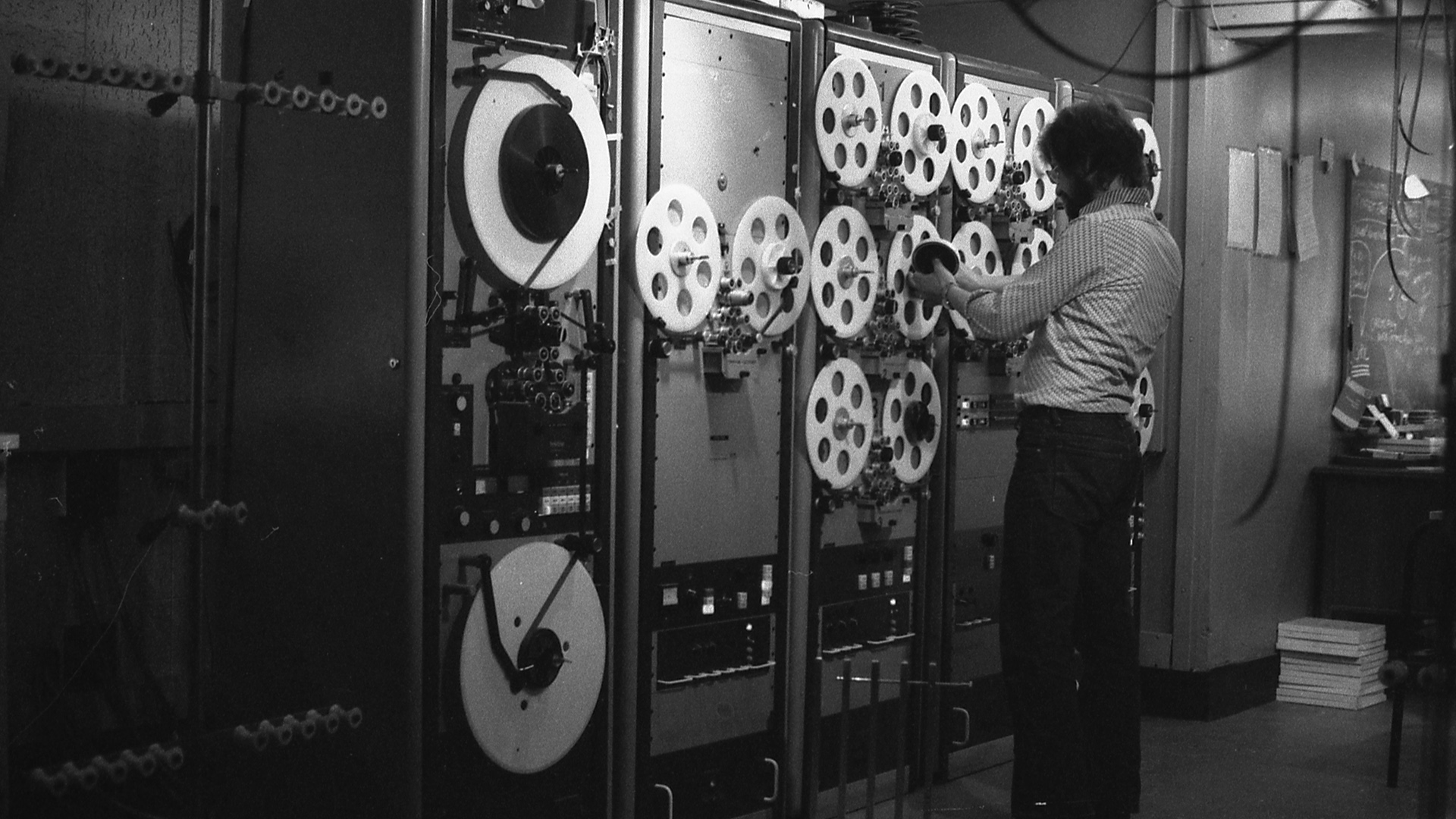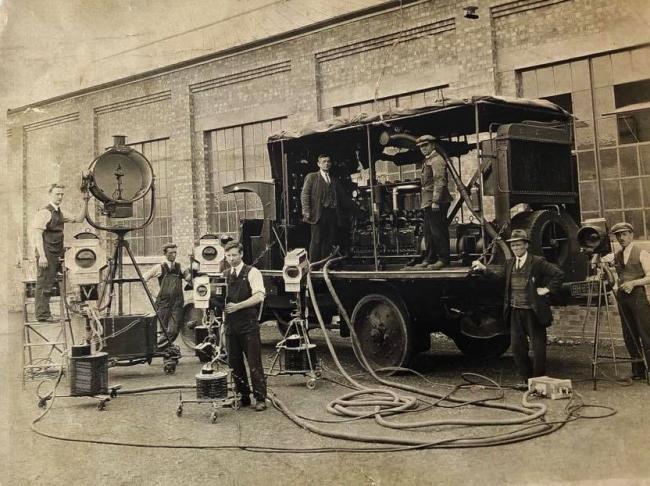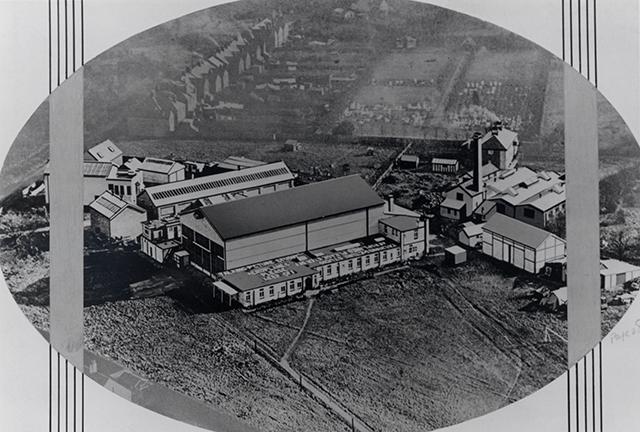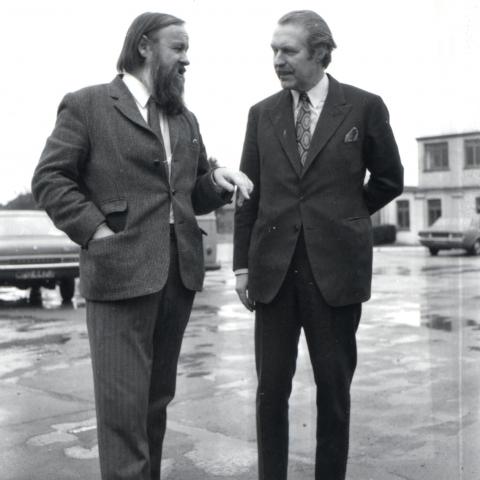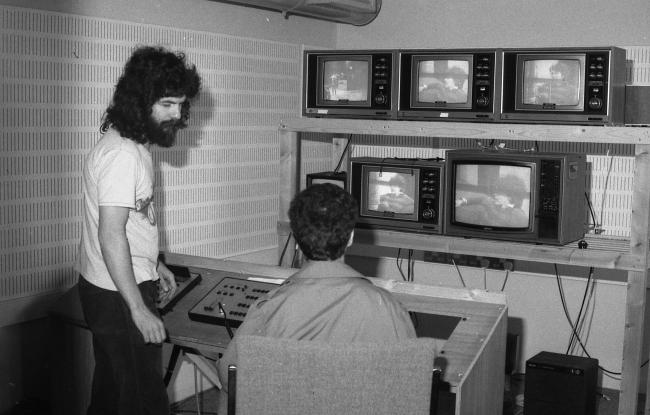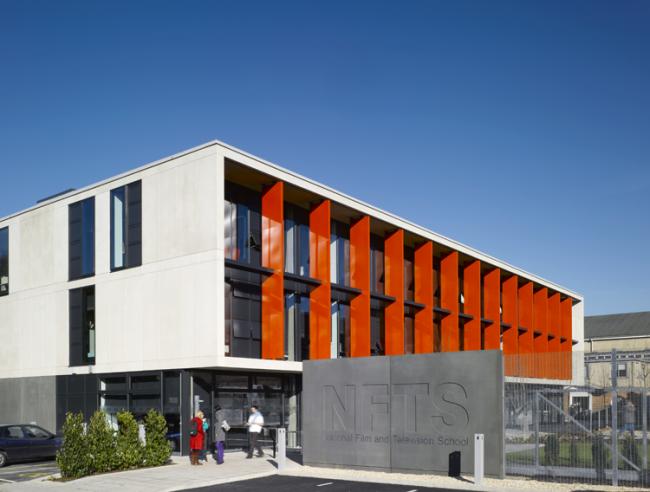History
The National Film and Television School began as the The National Film School in 1971 - the culmination of a major effort by the Industry and government to create an institution to educate and train talent for the British film Industry.
Over 50 years on and the School has established itself as not only one of the world’s best film schools, but as a centre of excellence for television and games design and development too. It was honoured by BAFTA with the 2018 Outstanding British Contribution to Cinema Award, and the Queen's Anniversary Prize for Higher Education in 2017. NFTS alumni are some of the most in demand and well-known creative talents worldwide.
The site the School stands on first opened for business as Beaconsfield Studios in 1921, over 100 years ago and was previously an epi-centre of British film history. Read on to find out more about the School’s incredible legacy both on and off the screen.
Content Tabs
The Studios were built in 1921 by George Clark Productions. The first production was a two-reeler comedy, The Beauty and the Beast, written, directed and starring Guy Newall. Various productions followed until 1924 when all British studios went quiet. In 1928, the Films Bill limited foreign films to 22.5% of the market. There was a rush of production activity and among new start-ups was The British Lion Film Corporation Ltd., with Edgar Wallace, the prolific thriller writer, as Chairman. As Wallace lived locally in Bourne End, the company purchased Beaconsfield Studios.
Wallace's story The Ringer was the new company's first production, followed in 1930 by Beaconsfield Studios' first talkie, The Squeaker. Wallace then left for Hollywood to write King Kong.
Between 1929 and 1939, those who came through the Beaconsfield studio gates included Sir John Gielgud, Sir Gerald Du Maurier, Emlyn Williams, Paul Robeson, Ben Lyon, Bebe Lyon, Gracie Fields, Margaret Lockwood, Jessie Matthews, Ray Milland, Herbert Wilcox, Val Guest, Hughie Green (as a boy actor), Sid Cole, David Lean (as an editor), Basil Dean, Carol Reed (as a writer), John Galsworthy, A.A.Milne and George Bernard Shaw. By 1939, another distribution crisis had hit the Industry and the Ministry of Works requisitioned the studios for Rotax to make aircraft engine magnetos for the war effort.
In 1946, Alexander Korda bought British Lion. He kept the company but sold the freehold of the Studios to King's College, Cambridge. The Crown Film Unit moved in and the government spent £146,000 on refurbishment and equipment. 75 films a year were produced for the Central Office of Information by filmmakers who included John Grierson, Humphrey Jennings and Lotte Reiniger. In 1949, following yet another exhibition crisis in the UK film industry, the Board of Trade introduced the Eady Levy, a tax on box office takings that was redistributed to British film producers as a mechanism to boost British production.
The Crown Film Unit was wound up in 1951, meanwhile the National Film Finance Corporation had set up Group 3, with a brief to encourage new British talent. They moved into Beaconsfield in 1953 and out again in 1955 when it was decided that a studio base was unjustifiable.
The producer Peter Rogers took over Beaconsfield Films Ltd in 1956, making The Tommy Steele Story (1957) before moving to Pinewood to launch the Carry On series. Television first ventured into Beaconsfield when Screen Gems Inc rented space in 1957-58 for their Ivanhoe TV series, starring Roger Moore. Next to take a lease on the studios were Independent Artistes who hosted a respectable run of British films including Tiger Bay, Blind Date, Battle Of The Sexes, Never Let Go, The Bulldog Breed, VIP, Crooks Anonymous, The Fast Lady, Father Came Too, This Sporting Life and The Wrong Arm Of The Law.
1963 brought yet another crisis and in 1964, Independent Artistes departed. The final feature film based at the studios was Press For Time shot in 1966, with Norman Wisdom in his last starring role. The studios were then leased to the North Thames Gas Board, who used the premises as a warehouse.
1971 saw a revival in the Studios' fortunes, when the NFTS purchased the freehold from Kings College with a grant from the Rank Organisation, making it the only UK film school with its own, purpose-built, film and TV studios and facilities.
“Filmmakers should be missionaries for a better way of life” Colin Young, NFTS Founding Director
In 1970, Colin Young co-founded the NFTS and was appointed as the School's first Director. The School bought the old Beaconsfield Film Studios and set about refitting it to professional industry standards. Young established four permanent departments - production, camera, editing and sound - and in 1971 the first intake of 25 students passed through the studio gates.
That original cohort came from all over the world, from the UK to the US, Eastern Europe to Israel and Australia. Among them was the School’s first trailblazing female, Broken Arrow Screenwriter and Director Dina Hecht, Director Michael Radford who would go on to be Oscar-nominated for his film Il Postino and Bill Forsyth who directed the BAFTA award winning Gregory’s Girl. Their counterparts also included Nick Broomfield, pioneering documentary maker of films such as Whitney: Can I Be Me, VFX Supervisor Dennis Lowe who would go on to work on films including The Empire Strikes Back and Producer Steve Morrison who went on to become co-founder and Chairman of All3Media.
The curriculum in the early days was secondary to production, with students spending most of their time doing exactly what they had come to the School to do - making films. But by the early 1980s, Young introduced a more structured curriculum. Links with the Industry were strengthened, allowing students' idealism and creative talent to be matched with collaborative, financial and production expertise.
In 1982, the School changed its name to The National Film and Television School, reflecting the fact that many of its graduates went on to make their careers in television. That same year it launched a pilot project for continuing professional development. Financed by a one-off grant from the Eady fund, this led to the establishment of the National Short Course Training Programme (now NFTS Short Courses Beaconsfield), which has been running courses ever since on all areas of film and television production.
By the early 1990s, the NFTS had modified its original stance on course structure, deciding to provide specialisation at the time of entry. The first year still offered a general course, followed in the next two years by focused training in one of the ten specialist areas of directing, writing, editing, camera, sound, animation, design, producing, documentary and composing.
Colin Young retired in 1992 and was succeeded by Henning Camre, formerly Head of the Danish Film School. Pushing Young's earlier decision to offer more specialised training to its natural conclusion, Camre aimed for more balanced numbers in each of the ten specialist areas, creating separate departments with their own head tutors and curriculum. The different departments were put on an equal footing to reflect the way the Industry outside was really functioning. At the same time, the full-time programme and the short course unit were fully integrated and television was given a much wider emphasis. Camre also secured a Lottery grant to install state-of-the-art new equipment, positioning the School to take full advantage of new production methods offered by innovations in technology and ensuring that graduating students could compete with the best as they embarked on their careers.
Camre moved on in 1998, to be succeeded by Stephen Bayly, an NFTS graduate and film producer (Richard III, Mrs Dalloway). His first move was to reorganise the curriculum to run over two years, instead of three. After a few weeks of cross-specialist workshops, where students swapped roles to learn the basics of each specialisation, courses focused in-depth on the professional field in which students had enrolled to train.
While NFTS courses had always been practice-based rather than academic, with graduates awarded a Diploma and Industry-recognised NFTS Associate status, Bayly recognised a growing trend towards a requirement for academic qualifications. The Royal College of Art agreed to validate the School's courses and 2000 saw the first intake of students who would graduate with an MA. In 2002, Bayly introduced the first of the shorter Diploma courses, established to meet an urgent Industry need for properly trained sound recordists.
In September 2003 saw Nik Powell, one of the UK's leading producers (Mona Lisa, The Crying Game, Ladies in Lavender), took over from Bayly. Powell rapidly expanded the programme of new courses, introducing MA courses in Directing and Producing Television Entertainment, Post-Production and VFX; and Diplomas in Production Management and Script Development. Drawing on his extensive international network of film and TV connections, Powell reinvigorated the programme of visiting filmmakers, and set up a programme of Masterclasses. He also introduced a range of development deals with broadcasters and independent production companies to help new NFTS graduates get started and, in 2005, we joined forces with The National Endowment for Science, Technology and the Arts (NESTA) to launch NFTS Inc, a Creative Pioneer programme supporting graduates of any UK film school develop start-up businesses in the moving image industry.
Nik Powell stood down in 2017 and was succeeded as Director by Dr Jon Wardle, who had previously been the School’s Deputy Director, Director of Curriculum and Registrar.
From just four departments in 1971, there are now more than thirty. The NFTS has evolved into the production powerhouse it is today, training over 700 students annually across more than 40 MA, Diploma and Certificate courses and supplying the creative sectors with highly skilled, professionally trained graduates who make an unrivalled impact on the film, television and games industry.
It consistently pushes into new territory to meet the ever changing demands of the industry, supporting students to work in an increasingly varied range of interdisciplinary genres and mediums.
It remains the only UK film school with its own film and television studios, and post-production facilities rivalling those of professional studios. A talented community of students make a slate of over 100 films a year which premiere to industry at an annual showcase event, acting as a launch pad for their careers. Most recently, the School has expanded its educational footprint across the UK to provide more training in Scotland, Wales and Leeds to meet the needs of the Industry.
To celebrate our 50th anniversary, we collaborated with Google Arts & Culture to open the vaults of our extensive archive for the very first time, launching a new collection of over 200 digitised films and behind the scenes material. The NFTS Digital Archive features a curated selection of student films made at the NFTS, complimented by a range of multimedia resources including behind the scenes stills, trailers, original screenplays and recent interviews. Explore at g.co/NFTS
Today, the NFTS remains instrumental in keeping the pipeline of talent bursting with the next generation of passionate, highly trained graduates and storytellers who will go on to become leaders and influencers at the forefront of the creative process.
Over the next 50 years and beyond, the NFTS is proud to continue its mission to produce the people that power production both in the UK and globally.

